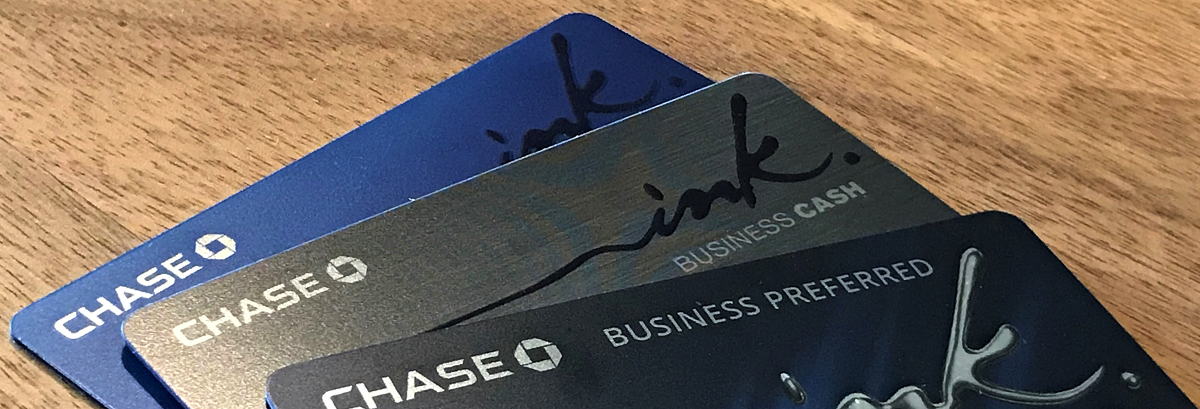NOTICE: This post references card features that have changed, expired, or are not currently available
Chase released a new business credit card in May 2018: Ink Business Unlimited. Like the Chase Freedom card, the Ink Business Unlimited is advertised as a cash back card, but it really earns Ultimate Rewards points: 1.5 points per dollar for all spend.
This is especially exciting for thos under 5/24. Just like the Ink Business Cash card, the Ink Business Unlimited offers a welcome bonus of $500 (50,000 Ultimate Rewards points) after $3K spend in 3 months. All of Chase’s no-fee Ultimate Rewards cards share a common trait: points are worth exactly one cent each unless they are moved to a premium card where they can then be transferred to valuable airline & hotel programs or can be used to pay for travel at better than 1 cent per point value. If you move your 50,000 Ink Business Unlimited points to a Sapphire Reserve account, for example, those points will then be worth $750 towards travel booked through the Ultimate Rewards website.
The appearance of this new card raises a couple of big questions: Will the old Ink Business Cash card stick around? And, will Chase really revoke the ability to pool points across accounts? (see: Leak: Chase may end Ultimate Rewards pooling). You’ll find my thoughts about each of these questions below. First, though, let’s look at Chase’s new Ultimate Rewards line-up…
Ultimate Rewards Lineup
Recently Chase has tweaked their Ultimate Rewards lineup to add symmetry between their consumer and business card lineups. Take a look:
|
Card Features |
Consumer |
Business |
|---|---|---|
| No-Fee 5X Cards | Freedom: 5X in rotating categories capped at $1,500 spend per quarter | Ink Business Cash: 5X at office supply stores and on internet, cable and phone services, up to $25K spend per account year |
| No-Fee 1.5X Unlimited Cards | Freedom Unlimited: 1.5X everywhere | Ink Business Unlimited: 1.5X everywhere |
| $95 Preferred Cards with points worth 1.25 cents each towards travel and transferable to airline & hotel programs | Sapphire Preferred: 2X travel & dining | Ink Business Preferred: 3X travel and select business categories |
| $450 Reserve Cards: $450 per year with $300 per year in travel reimbursements. Points worth 1.5 cents each towards travel and transferable to airline & hotel programs. | Sapphire Reserve | N/A |
As you can see above, the Ink Business Unlimited fills in a gap in Chase’s apparent desire to balance out their Ultimate Rewards card portfolio between consumer and business cards. The only remaining gap is at the high-end. The ultra-premium Sapphire Reserve currently has no business-oriented equal.
Does this mean that an Ink Business Reserve card is on it’s way?
It seems likely to me that Chase will introduce an ultra-premium business card, and even more likely that it will be called the Ink Business Reserve. I’d guess that this card will duplicate some of the Sapphire Reserve’s features including the $450 annual fee, the $300 per year travel reimbursement, and points worth 1.5 cents each towards travel. The part I can’t wrap my mind around is what bonus categories would make sense? The Sapphire Reserve’s earning structure was designed to be just like the Sapphire Preferred, but 50% better: 3X travel & dining instead of 2X. But with the Ink lineup, the $95 Ink Business Preferred already offers 3X for travel and select business categories. I highly doubt that the Ink Business Reserve will offer 4X or 5X categories… but if they want to, I’m game.
Will the old Ink Business Cash card stick around?
Yes. My whole premise here is that Chase is working towards balancing their consumer and business Ultimate Rewards portfolios, so I expect the answer here to be yes. Just as they kept the Freedom 5X card around after introducing Freedom Unlimited, I’m willing to bet that the Ink Cash 5X card will stick around too. Plus, don’t forget that Chase recently increased the standard bonus on the Ink Cash from 30K points to 50K. That’s not a change a company makes when they’re about to pull the plug.
Will Chase really revoke the ability to pool points across accounts?
Nope, but I predict a wall between consumer and business cards.
In our post “Leak: Chase may end Ultimate Rewards pooling,” we reported that Chase is actively looking at eliminating the ability to move points to a more valuable card. As I discussed above, today it is possible to increase the value of points earned on an Ultimate Rewards card by moving points from a no-fee card to a premium card or to an ultra-premium card, or by moving points from a premium card (Sapphire Preferred or Ink Business Preferred) to an ultra-premium card (Sapphire Reserve). It’s possible that Chase will end this ability, but I don’t think so… at least not entirely.
Yesterday I reported that negative changes are coming to the Sapphire Reserve card, but that this might be a good thing. My hope is that Chase’s slight devaluation of Sapphire Reserve benefits is happening instead of an end to point pooling.
Of course, there’s a middle ground that I think is quite likely. With Chase obviously paralleling the consumer and business Ultimate Rewards card lines, it wouldn’t surprise me if they simply ended pooling across consumer and business cards. That is, they would still allow moving Freedom and Freedom Unlimited points to Sapphire Preferred or Sapphire Reserve accounts, but they wouldn’t allow moving points on those consumer cards across to Ink accounts. Similarly, Chase would allow moving Ink Business Cash and Ink Business Unlimited points to Ink Business Preferred or Ink Business Reserve (if that ever appears) accounts, but not to Freedom or Sapphire accounts.
If Chase separated pooling in this way, it would certainly irk many who rely on moving points across the consumer/business divide, but I don’t think that it would tank the value of holding an Ultimate Rewards portfolio of cards in your wallet the way that a complete ban on pooling would. This is especially true after Chase introduces the predicted Ink Business Reserve card with it’s predicted 1.5 cents per point redemption value for travel.
5/24 Planning
| Chase's 5/24 Rule: With most Chase credit cards, Chase will not approve your application if you have opened 5 or more cards with any bank in the past 24 months. To determine your 5/24 status, see: 3 Easy Ways to Count Your 5/24 Status. The easiest option is to track all of your cards for free with Travel Freely. |
As Chase introduces more Ultimate Rewards cards with big signup bonuses, 5/24 planning becomes more important than ever. All Ultimate Rewards cards are subject to 5/24, but only the consumer cards are included in your 5/24 count. This means that those who are under 5/24, but close to going over should start by applying for Ink cards. While under 5/24 it will still be possible to get approved, and those approvals will not increase your 5/24 count.
For a real-life example of this approach, please read “Over 600,000 points and well under 5/24.”
| Applying for Business Credit Cards Yes, you have a business: In order to sign up for a business credit card, you must have a business. That said, it's common for people to have businesses without realizing it. If you sell items at a yard sale, or on eBay, for example, then you have a business. Similar examples include: consulting, writing (e.g. blog authorship, planning your first novel, etc.), handyman services, owning rental property, renting on airbnb, driving for Uber or Lyft, etc. In any of these cases, your business is considered a Sole Proprietorship unless you form a corporation of some sort. When you apply for a business credit card as a sole proprietor, you can use your own name as your business name, use your own address and phone as the business' address and phone, and your social security number as the business' Tax ID / EIN. Alternatively, you can get a proper Tax ID / EIN from the IRS for free, in about a minute, through this website. Is it OK to use business cards for personal expenses? Anecdotally, almost everyone I know uses business cards for personal expenses. That said, the terms in most business card applications state that you should use the card only for business use. Also, some consumer credit card protections do not apply to business cards. My advice: don't use the card for personal expenses if you're not comfortable doing so. |






[…] Unlimited card last year, I predicted that they weren’t done developing Ink cards (see: Chase’s new 50K offer and their evolving Ultimate Rewards lineup). In that post, I published a nifty side by side table to show that Chase’s Ultimate […]
Do you think it will be no foreign transaction fee?
The card has a 3% foreign transaction fee
I am well under 5/24, should I get both Ink Business cards at once to get the spend bonuses and move the points to my main account now? Just to be clear, if I get both, when I go to get another Chase card, the business cards wont count against 5/24, correct?
Yes, that’s a good plan if you can meet the spend requirements. Correct about 5/24
[…] Chase’s new 50K offer and their evolving Ultimate Rewards lineup […]
[…] Frequent Miler has some good thoughts about where our favorite bank is going with the Ultimate Rewards cards. I tend to agree but time will tell. As it always does. Chase’s new 50K offer and their evolving Ultimate Rewards lineup. […]
@Greg In this hypothetical world, would points pooling between household members still exist? Specifically, could “Spouse A” earn points on Ink Cash, move them to Ink Preferred held by “Spouse B”, then transfer to travel partners?
Good question. I’d hope so but I could imagine them requiring that the transferee be in the same company
When the rumor came out regarding Chase limiting moving points between cards, many moved points to their Chase Card where UR points are worth the most. In my case, that’s my Chase Ink Preferred (don’t get have the Reserve). But, if I’m going to apply for the Reserve later this year, would you then suggest I move my points back to my Freedom so that they’ll be on the PERSONAL side of the points wall?
No, if they make this change you may not get notice. Keep these on the preferred until you get the Reserve card.
Great question. If they do the business/consumer wall, then yes, but if they stop point pooling altogether, then no. It’s a gamble either way (even though I think the business/consumer wall is more likely). If you decide to leave points on the business side and if they come out with an ultra premium biz card, you could probably upgrade to that card in order to improve the value of your points.
Will Chase limit the number of Business Cards they’ll give you? We have 1 (Ink Business Preferred), for a very small, new business with almost no revenue at this point, and want to apply for the SW business card around October as a part of earning the SW Companion Pass. Were we to apply for Chase Ink Cash now; do you think that’d hurt our chances of getting the SW Business Card?
They don’t have a hard limit, but yes applying for Chase cards now will make it harder to get approved for a new one in October, especially with a business with little revenue.
And going by your logic that they’re aligning business and personal cards, then just as you can’t have both a Sapphire Preferred and Sapphire Reserve, you won’t be allowed both an Ink Preferred and Ink Reserve.
When chase showed/advertised their new Marriott card, if you swiped to the right one of the cards listed was a Marriott business card with a $450 annual fee. My prediction is this will also be a premium business card offering.
Interesting. Yes, that makes a lot of sense. Marriott will probably have an ultra premium business card that compares to the SPG Lux card that’s coming out.
Do you happen to still have a link for seeing this? In looking at everything out there now, including that I have existing Marriott business card, I would be interested in seeing that datapoint. I would definitely agree with Greg’s reply that countering SPG luxury would make sense (as well as Bus Platinum/Citi/etc.. high end business cards
I found the link
http://credit-cards.marriott.com/en-us/marriott-rewards-us
You will need to scroll down to the pic of the chase cards, then swipe LEFT until you get to the business card with $450 annual fee.
The big annual fee business card is the last one you will see.
I think that’s just a bug in the mobile view. The same card shows up in desktop view as $45.